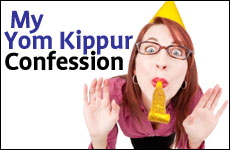 Vampire Weekend's Surprising Jewish Stories
Vampire Weekend's Surprising Jewish Stories


5 min read
My tip for a more meaningful Yom Kippur – lighten up.
Yom Kippur. Just hearing those two little words can trigger the “Ashamnu Reflex” in many Jews, causing them to involuntarily start thwacking their right fists over their hearts and recite from memory the litany of sins they transgressed. Though Yom Kippur is arguably our least “fun” holiday, few Jews are willing to miss the chance to pay good money for a seat in shul and start thwacking away. This is puzzling: If you’re only going to get to shul once or twice a year, why not go on Purim or Simchat Torah, when you can sing, dance, eat, get tipsy and wear funny hats?
The day when God tallies up all our year’s misdemeanors, every Jew shouts “I’m in!”
It must be that Yom Kippur has a deep, primal meaning for all Jews. Either that, or we really must like suffering, at least in moderate doses. No Jew wants to be left behind on what can seem like Worldwide Jewish Guilt Day. Go figure: The day when God tallies up all our year’s misdemeanors, derelictions and felonies on that great celestial calculator app, every Jew in the known universe shouts “I’m in!”
I have my own Yom Kippur confession to make: I think we need to lighten up about this holiday. Now before you start hurling chunks of potato kugel at my head for blasphemy, let me explain. For thousands of years, lots of Jews have been spending what is supposed to be a Day of Awe instead as an Awful day. I should know: I’m one of them. I used to wonder, how did God expect me to concentrate on regret and contrition for my blunders and misdeeds when my empty stomach was bellowing louder than the shofar, disturbing everyone in my row? One year I felt so crazily hungry that when we read about the Yom Kippur offerings of a he-goat, I wondered how said goat would taste on the grill. I quickly snapped myself back to reality and tried to refocus on my woeful lack of spiritual refinement. From sheer guilt, I started thwacking myself on the chest again, even though we were in between thwacking sessions.
I would never suggest changing Yom Kippur to “Yum Kippur,” complete with a goat kabob Kiddush, God forbid. I know that fasting is good for us, and over the years, I’ve gotten better at it. Where I feel we need to lighten up is in getting over that pesky word that follows us throughout the day in our Yom Kippur prayer books: sin. That little word packs an intimidating punch, and incites a feeling of guilt inside me. Besides, I may – may – have done a lot of things on that rap sheet, but not all of them!
The good news is that the word “sin” is almost never an accurate translation for all those malfeasances the Hebrew is talking about. English is a fabulous language, but it’s no match for Hebrew in terms of nuance, subtlety and economy. Truth be told – and this close to Yom Kippur you better believe I’m on my best truth-telling behavior – in Hebrew, the iniquities we’re admitting to sound less like we deserve forty lashes (or worse) and more like we’re fallible folks who could really use a few “do-over” opportunities.
For example, chet means that we have "missed the mark." Avon means "desire," which may explain the familiar phrase “Avon calling!” Pesha means "rebellion." When I discovered what these words really meant, I immediately began to enjoy Yom Kippur much more. I felt less like a candidate for the Jewish mafia and more like a well-meaning Jew who just blew it a few times. Okay, more than a few times. Feeling less like an inveterate sinner and more like someone who just needed some time to reflect and regret made it a lot easier to commit to self-improvement. Sure, I may have missed the mark, been rebellious, and indulged my desires, especially for dark chocolate (which I consider a misdemeanor at best). But let she who is without desires for dark chocolate cast the first hunk of potato kugel!
The other thing I’ve never been good at with Yom Kippur is all that fear and trembling business. Believe me, I know this is one serious day, and I admire my fellow brother and sister Jews who carry off this supremely impressive trembling as they pray as if they were born to it. I confess again: I am not there yet. The funny thing is that my Yom Kippurs have become much more meaningful – even transformative – when I stopped worrying that I wasn’t praying like someone else who seemed to be doing it “better” and when I focused on approaching God just like it says in the machzor: as Avinu Malkeinu. He’s our Father first, and King second. My Father loves me for sure. He’s rooting for me, and unless you’re guilty of some of the more breathtaking crimes listed in the litany, He’s probably rooting for you, too. I always cry during “Avinu Malkeinu.” It gets to me every time, as I try to picture God listening to the entire Jewish nation in prayer, pleading for another year of life, just because we are His children, He wants us to live and grow, and, if possible, to learn to stop coveting BMWs. Wow. What a moment.
Ironically, “lightening” up my approach to Yom Kippur has helped me see it in the way I think it was meant to be seen: a day to feel elevated by God’s love and inspired to live as a better Jew, one Awesome day at a time.
